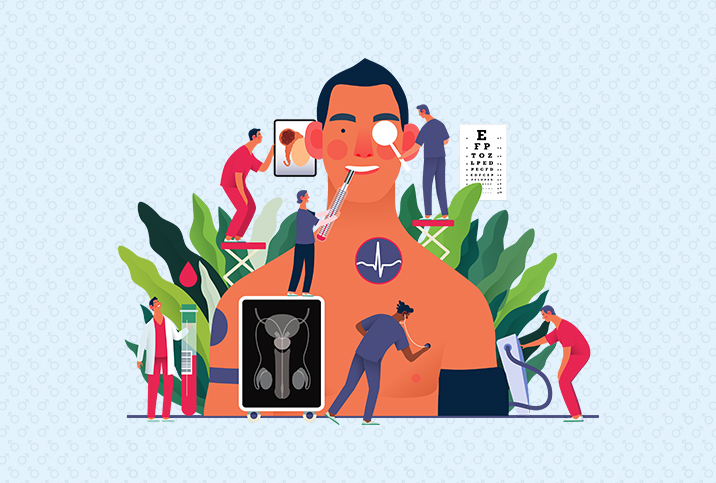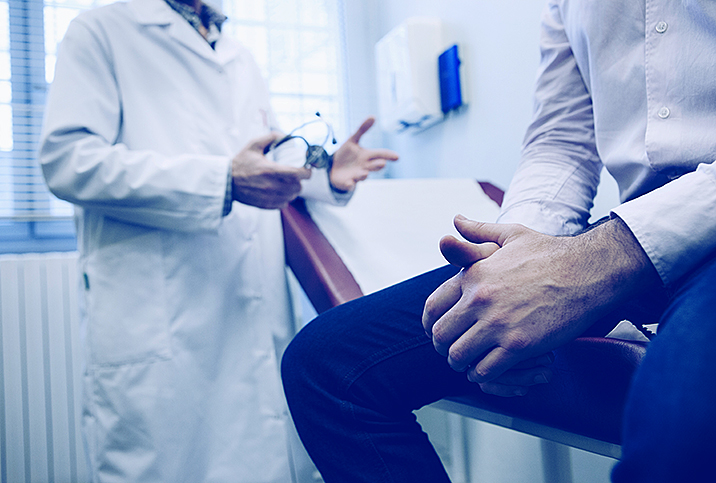5 Do's and Don'ts for Improved Genital Health

Most boys, by the time they are lucky enough to be in middle school, know the pain of being hit in the genitals. The administration at my middle school had to have a meeting about it with all the boys in the cafeteria after dismissing the girls for class. Apparently, the frequency of unannounced and forceful "cup checks" was common enough that it was becoming a problem.
While this may have seemed funny to a bunch of preteen boys, there was very real danger in inflicting testicular trauma to one another. Plus, once you're given the "sex talk," you tend to start caring a bit more about yourself below the belt.
Hopefully, adults have moved past such immature behavior, but that doesn't mean testicular woes are over. In fact, as men get older, they start to realize there are far more genital-related problems than they'd probably prefer. Commonly, we're talking about conditions such as erectile dysfunction (ED), sexually transmitted infections (STIs), fractures, anorgasmia and cancer. Then, of course, there are all the ailments that can lead to penile issues—diabetes, heart disease, mental health disorders and so on—and fluky occurrences such as testicular torsion.
It's scary if you think about it too long. Fortunately, there are things you can do to improve your genital health. And then there are some things you should absolutely avoid.
Do: Visit your doctor regularly
This one really should be obvious, but the best way to ensure you're healthy—and this doesn't even have to be about your penis—is by seeing a medical professional and getting regular checkups.
Frankly, without professional input, many penile issues can either go unnoticed or be mistaken for something else entirely.
"Urinary problems (difficulty starting, weak flow, a frequent sense of urgency, pain when urinating, blood in urine), pain when ejaculating, blood in semen, consistent bone pain—any of these could be signs for a number of problems," said Dan Sperling, M.D., the medical director at Sperling Prostate Center in Delray Beach, Florida.
Pain when urinating could be an STI, the first sign of prostate cancer, or perhaps a urinary tract infection (UTI) or prostatitis. You never really know unless you talk to a professional.
Don't: Withhold information because 'I'm a man'
Here's a disappointing statistic: More than 40 percent of men don't go to the doctor at all unless they have a serious, immediate issue, according to Tri-City Medical Center in San Diego County. Harvard Health attributes this to traditional views on masculinity. Men don't feel like they need help, and they're certainly not going to ask for it.
"Some of my patients came to me at the first signs of a problem," said S. Adam Ramin, M.D., a urologic surgeon who practices at several hospitals in the Century City district of Los Angeles. "Others waited, unfortunately, years in some cases. The brutal but straightforward truth about most problems is this: The earlier they're caught, the more likely they are to be cured."
Some men may think seeing a doctor is like Schrödinger's cat: If they never get tested, they'll never be told they have a problem. But that isn't the case. Schrödinger's cat, after all, is a paradox that claims that until you look in the box, the cat is both alive and dead. Medically speaking, though, you have a condition or you don't, and not knowing doesn't make the problem disappear into a vortex of quantum mechanical thought—it just damages you and makes treatment options more difficult to come by.
"The longer a man waits, the fewer his options are," Ramin said.
Do: Maintain a healthy diet and weight
You're probably not doing penis exercises at the gym, but that doesn't mean those leg days are going to waste (but not doing them may go to waist).
"We tell men that heart-healthy equals prostate-healthy, and diet is a key factor in that equation," Sperling said, the unstated point being that the prostate can affect the genitals.
Your diet impacts all areas of your life, but it is especially vital in preserving genital health. As Sperling said, substances that affect heart health—cholesterol, fats, proteins and sugars—equally affect the rest of your body. Given that the primary contributor to erections is blood, ending up with poor cardiovascular health means you're more likely to experience problems with your penis.
People living with diabetes or eating disorders tend to have to deal with erectile dysfunction more often as a result.
Men who live a healthy lifestyle have better odds of surviving a cancer diagnosis.
Don't: Obsess over your physical appearance to the detriment of your health
Men are under a fair amount of pressure to look a certain way, though maybe it isn't discussed as often as it is in relation to women. Famous, world-class athletes are constantly seen boosting their muscle mass with the aid of steroids, while men struggling with eating disorders, such as bulimia, anorexia and bingeing, often go unnoticed or untreated.
Yes, it's important to eat well and exercise, but as with anything else, there is a limit at which it becomes unhealthy.
Sperling and fellow urologist Brian Helfand, M.D., who practices at NorthShore Medical Group in Glenview, Illinois, both recommend heart-healthy diets full of plentiful fruits, vegetables and proteins, as well as limiting consumption of saturated fats, sugars and meats with potential toxins (smoked meats and barbecue). Thirty minutes of exercise at least five times a week, they say, should be plenty for most people looking to maintain a healthy frame.
Do: Know the facts (and be sure they're factual)
A lot of misinformation floats around on the internet—shocker! This has never been more prevalent than with the COVID-19 vaccines, but we can take that as a lesson: Don't trust everything you read online. Current research shows that the vaccines don't affect fertility or penis health, but the disease itself can potentially affect both, damaging sperm and contributing to erectile dysfunction.
Numerous, trustworthy resources are available to men, but the most direct and personal source is going to be a healthcare provider you trust. Ramin ventured to say that finding a trustworthy physician is "absolutely necessary."
"Men are more likely to make health screenings a priority when they are comfortable and have a good relationship with a doctor they trust," he said.
Ultimately, the best course of action for anyone looking to improve and maintain their genital health is to understand the reality of their situation, talk with a trusted healthcare professional, and work together to make positive changes that will lead to a happier, healthier life.


















